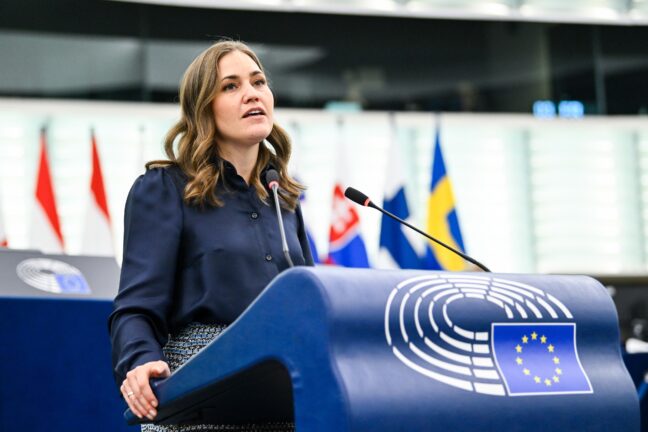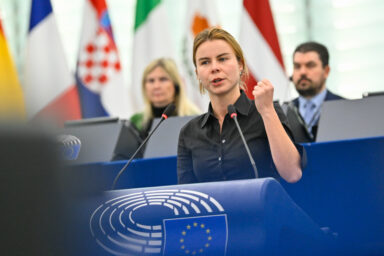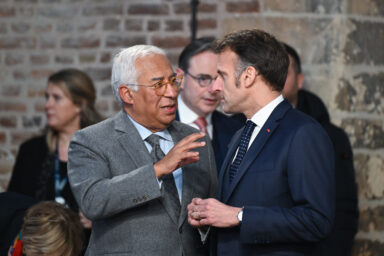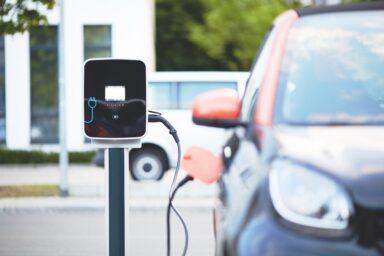Stark and competing blueprints on defence, industrial policy, climate and humanitarian duty were on display in Strasbour gon Wednesday, 22 October as MEPs prepred for Thursday’s meeting of the European Council in Copenhagen. They agreed on urgency and need for unity, disagreeing on most other things.
The session clustered around a few clear themes: Ukraine and accountability; strategic autonomy and industrial policy; defence and preparedness; the Green Deal and climate; and social strains at home. Marie Bjerre, Denmark’s EU minister, opened the debate in Strasbourg ahead of the European Council meeting scheduled for 23 October 2025. Ursula von der Leyen, President of the Commission, and a range of MEPs followed.
Marie Bjerre, Denmark’s EU minister, opened the debate, setting Ukraine at the top of the agenda. “The European Council will discuss the situation in Ukraine as Russia continues its relentless attacks against Ukraine’s civilians and civil infrastructure,” she said. “Leaders will focus on stepping up support to Ukraine, including financial support, for the coming years.”
Accountability, legal limits on Russia/Ukraine
Martin Hojsík (Renew/SVK) was on board, pushing the case for financial accountability. “When you invade another country and kill civilians there, why should your money be protected?” he asked, arguing that Russia should bear financial responsibility for the war. After the debate, his fellow Slovak MEP Branislav Ondruš (NI/SVK), speaking to his coutry’s media, offered an opposing view. He warned that using frozen Russian central-bank assets “is contrary to international law”. He warned that it could undermine confidence in the euro as a global reserve currency. The chamber thus set two competing imperatives—accountability and legal prudence—before ministers leave for the Council.
Ursula von der Leyen, President of the Commission, framed a wider economic theme—strategic autonomy. “We cannot afford to fall into new and dangerous dependencies,” she told the plenary. She warned that dependencies can be “turned into instruments of pressure.” She pressed the case that “Europe must control the technologies that will shape our future, and the critical raw materials.”
You might be interested
Jordan Bardella (PfE/FRA) counterposed a sharp deregulatory prescription. “It is time to free our businesses, to unleash our productive forces, to suspend the Green Deal without delay,” he said. Seán Kelly (PPE/IRL) narrowed the debate to domestic competitiveness and the labour market, arguing that housing shortages hamper growth. “The upcoming European affordable housing plan is a crucial opportunity to deliver a practical, business-friendly and future-orientated framework,” he said.
Industrial sovereignty
The result was an uneasy triangle—sovereignty, deregulation and social infrastructure—forced into a single economic conversation. Ms von der Leyen urged control over supply chains; Mr Bardella urged regulatory rollback; Mr Kelly urged targeted public investment.
Valérie Hayer (Renew/FRA) and Manfred Weber (EPP/DEU) drove the defence and preparedness thread. Ms Hayer asked bluntly about readiness: “How to protect ourselves? How to ensure the security of our peoples? Is preparing for war really the condition for peace? The threats against Europe show us that yes.” She blamed complacency and over-reliance on external capabilities.
Mr Weber warned against appeasement and domestic soft-pedalling toward Moscow. “Again, we can underline—that more red carpet than in Alaska is not possible,” he said, and insisted that “Putin has only one interest and that is destroying our European way of life.” Giannis Maniatis (S&D/GRC) called for an integrated approach: “The Commission’s roadmap for Defence is a useful tool but not enough on its own” and the Council must give political direction so measures do not remain “simple wishful thinking.”
Defence, deterrence, unified strategy
The defence strand linked preparedness to political will. Ms Hayer demanded responsibility; Mr Weber demanded clarity about opponents; Mr Maniatis demanded coherent EU-wide direction.
MEPs Bas Eickhout (Greens-EFA/BEL) and Gerben-Jan Gerbrandy (Renew/NED) defended long-term climate strategy as central to prosperity. Mr Eickhout warned: “Let’s be very clear, tomorrow we will see the biggest attack on the Green Deal by the heads of state,” calling such attacks “very concerning” for Europe’s future. Mr Gerbrandy named climate as the unavoidable risk: “Climate change is 100% sure that it’s coming for us and for our European way of life,” and urged the “relentless focus and effort” President von der Leyen once demanded.
Let’s be very clear, tomorrow we will see the biggest attack on the Green Deal by the heads of state. — MEP Bas Eickhout (Greens-EFA/BEL)
Iratxe García Pérez (S&D/ESP) and Manon Aubry (The Left/FRA) injected a moral and humanitarian register. Ms García Pérez framed policy as a question of dignity and social purpose: “Let’s build a Europe that looks its citizens in the eye again,” she said, urging shelter, peace and work. Ms Aubry pressed a harsh humanitarian claim: “The genocide in Gaza is not over,” describing blocked supplies and mass suffering and demanding urgent relief and accountability.
Domestic resilience
Patryk Jaki (ECR/POL) delivered a forceful domestic critique, accusing leaders of presiding over decline. “Madam President! Madam Minister! Europe is collapsing because of you,” he declared, listing perceived failures in industry, innovation and security and denouncing contradictory messages that call for deregulation while keeping climate goals.
Humanitarian urgency and social cohesion thus joined strategic debates about power and prosperity. The moral claims pushed for immediate relief; the domestic critiques demanded coherent policy that works for citizens.
Madam President! Madam Minister! Europe is collapsing because of you. — MEP Patryk Jaki (ECR/POL)
A short, sharp brief will go with ministers to Copenhagen—urgent on security, heavy on legal and fiscal trade-offs. They also split on the balance between strategic investment and short-term economic relief. Capitals must reconcile moral duty, resilience and prosperity within a narrow political window.











